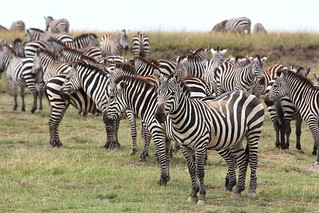Everybody has known lions as the ‘Kings of the Jungles.’ For years, they’ve dominated the African Wild and easily maintained their status as most dominant in the African Wild and Jungles. However, recently, a somewhat new and indirect foe has halted the Kings of the Jungle quest. In a recent ScienceNews article, it was discovered that the invasive species Pheidole megacephala, more commonly known as big-headed ants, has indirectly made Lions switch their prey from the preferred zebras to buffalos.
The big-headed ants, seemingly originally imported on produce, prey on the native acacia ants. Although it may seem like a slight difference in an ecosystem, it starts a big chain event. Without acacia ants, who live near whistling thorn trees, elephants can graze on the trees freely. Usually, when acacia ant populations are normal, they stop elephants from grazing on the trees and keep the grassland covered. However, without them, the lions are forced to switch from their primary prey, zebra, to buffalo. Although the lions are still able to successfully hunt, being tertiary consumers, it can potentially be detrimental to their ability to survive. Lions are tertiary consumers, meaning they are at the top of the tropic levels. This indicates that for lions, it’s super hard to get the energy necessary to survive due to the loss of power when transferring from one tropic level to another. Basically, the lions have a super-low availability of energy, and losing the ability to hunt zebras makes this even lower, putting them in even greater danger of going extinct.
For Lions, whose wildlife numbers have dwindled 75% in the past 5 decades, losing a crucial prey could have immense effect. Right now, the impact the introduction of invasive ants will have on Lions is unknown, but since most invasive species come from human trading or shipping, We should feel responsible for helping lions and animals we have exposed to invasive species due to our actions. If you know any other examples of invasive species messing up an ecosystem or how humans impact the introduction of invasive species, let us know in the comments!




Leave a Reply